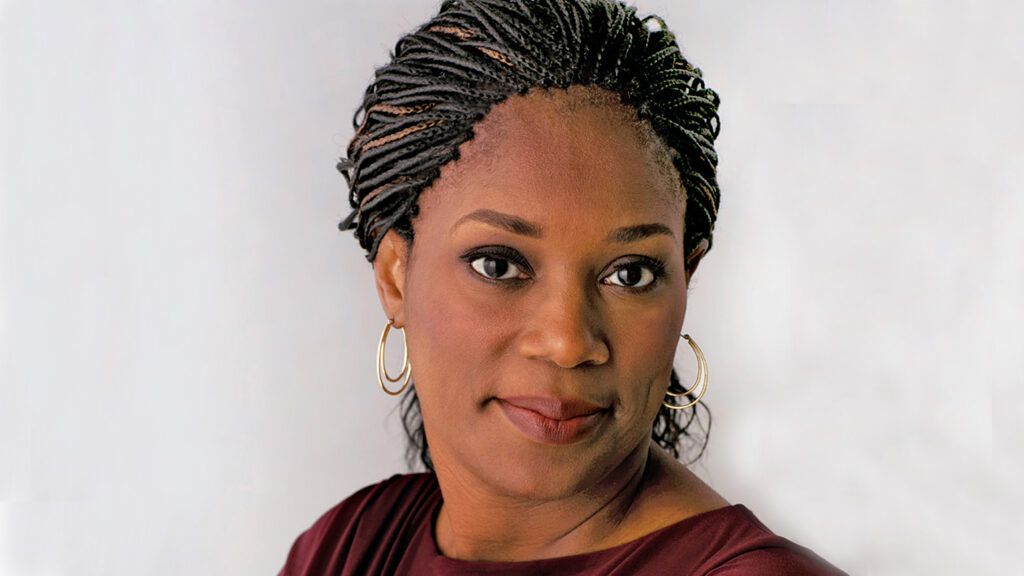August 20, 2013. I started the day in darkness and went in search of light. Literally and spiritually. Same as every morning lately, ever since my husband–the man I’d loved since we were kids–left me. At one point I felt so hopeless and broken I tried to end my life, but God saved me from myself.
Now I was leaning on my faith harder than ever. I got up in the dark, 5:00 a.m., and went down to the kitchen. Turned on the light, sat at the table and talked to God, told him what was going on in my head and my heart, the questions and doubts I had.
Then I sat in silence and listened. That was something I’d been working on these past weeks, clearing my mind so that even when my world was crumbling, God’s words could come through. I ended my quiet time reading the Twenty-third Psalm.
I fixed a hot breakfast–bacon, eggs and toast–for my 22-year-old son, Derrick. I could hear him pulling himself down the stairs. He was born with a neurological disorder that’s left him legally blind and unable to walk.
Yet if you spend just a little time with him, what you notice aren’t his disabilities but his God-given gifts: his lively mind, his singing, his irrepressible joy in life. He was making his way through college, following in the footsteps of his smart older sister, LaVita, who was in law school.
Derrick climbed into his wheelchair and rolled over to the table. “I gotta get to the school,” I said. “I put your lunch and dinner in the fridge.” We liked to eat together but by the time I got home–I’d been working three jobs to make ends meet–it would be late.
“Thanks, Momma,” Derrick said, hugging me quick. “Love you.”
“I love you too, baby.”
I pulled into the parking lot at Ronald E. McNair Discovery Learning Academy, the Atlanta elementary school where I’m the bookkeeper, and was in my office by 7:00 a.m. I paid some vendors’ bills, updated the school database, did a bit of paperwork.
The principal stopped by and asked if I could cover for the receptionist from 12:30 to 1:00. No problem.
I was about to head up to the front office when a call came in on my cell phone. A woman from my bank. “What’s wrong?” I asked.
In all the upheaval of our marriage breaking up, some payments weren’t made, and $14,000 was due immediately, or I’d lose our house.
I hung up and wept. Somehow I had to keep a roof over Derrick’s head. What in the world are we going to do now, Lord? I asked.
My office phone rang. The receptionist, wondering where I was. I pulled myself together and went to the front office. I took the desk behind the counter. Belinda, one of our new teachers, stopped to ask my advice about health insurance.
Just then the door swung open. A short, stocky man. Black T-shirt, pants, shoes, backpack. Around my son’s age. But not like him. Not like him at all. He held a long black gun, a rifle, one hand on the barrel, the other on the trigger.
Must be a prank, I thought.
Then I saw his eyes.
Eyes don’t lie, and his were burning. “This is not a joke!” he yelled. “We are all going to die today!”
Belinda stifled a gasp. All the man had to do was run through the side door of the office, take a few steps down the hall, and he’d find classrooms full of vulnerable kids. There were more than 800 children at McNair, 250 on this floor alone.
The man waved his rifle. “You need to do exactly what I tell you,” he said. He looked at Belinda. “You. Go tell everyone in the building I’m here.”
Belinda glanced at me.
“Go on,” I said. “Do what he says.” Belinda went out the back door to the teachers’ lounge. I heard her yell, “Intruder alert!” That’s the phrase we’ve been trained to use if there’s a security breach. Then came the commotion of a room emptying in a hurry–chairs scraping, shoes scurrying.
The gunman paced like he wanted to bust out of his skin. “All this movement,” he said. “Tell them to stop!”
“They’re just doing what you told them,” I said. “Don’t get alarmed.” My heart was thumping, but my voice sounded calm and assured, the way I’d read from Psalms this morning. I will fear no evil: for thou art with me…
He cracked open the side door and pointed his rifle down the hallway. I saw Russ, our media specialist, scrambling for the media room. He’s going to kill Russ, I thought. Then he’s going to kill the children.
“Come back in here,” I told him. “It’s okay.”
He listened. He lowered his rifle and closed the door.
I understood the gravity of my situation. There was a good chance I wouldn’t see Derrick and LaVita again, but every word I spoke could mean the difference between life and death for someone else in the building. The longer I kept the gunman with me, the more children would get to safety.
“What is your name?” I asked.
No response. No eye contact. Just pacing and muttering.
The front door opened. Lou, our cafeteria manager, sauntered in, a big smile on his face like always. He saw the rifle and froze. The gunman aimed at the floor, fired. The bullet ricocheted across the room. A bitter, smoky smell filled the air.
“You.” He pointed at Lou. “Tell everyone this is happening.”
“Do what he says,” I told Lou. “Go.”
“Get on the intercom,” he ordered me. “Let everyone know this is for real.”
I grabbed the microphone. It shook in my hands. But oddly my voice was steady. “This is not a drill,” I said over the intercom. “We have an intruder in the building. Everybody stay calm, and everything is going to be all right.”
“Call 911,” he said. “Tell them I’m going to start shooting.”
I got a 911 dispatcher on the line. “I’m on Second Avenue in the school. There is a man here with a rifle and he said he’s going to start shooting…”
To prove his point, he propped open the office door with a chair and walked the few steps to the main entrance of the school. He poked his rifle out the glass doors and opened fire. Pop, pop, pop, pop.
Maybe I could make a run for it. Get out the back door before he turned the rifle on me. But my feet wouldn’t move.
The gunman came back inside, breathing hard, rifle smoking. He gave me instructions for the 911 dispatcher–tell the police to back off, stop all movement on the ground, stay off the police radio.
I relayed his instructions. Then I put the phone back in its cradle–but I pressed the hold button first so the call wasn’t disconnected. The gunman couldn’t see the hold light blinking behind the counter.
“Call a news station,” he barked.
I pulled up Google on the computer and searched for a news station. He opened his backpack and took out something black and bulky. A magazine that held ammunition for his rifle.
He pulled a handful of loose bullets out of his pack and loaded them into the magazine. He filled four or five magazines. He yanked the empty magazine out of his rifle and snapped on a loaded one. It locked into place with a chilling metallic sound.
“Here’s a number for Channel 2 News,” I said. I dialed the station. “I have a man here with a gun…”
“Tell them I want a news helicopter,” he said.
I told them.
“I want them to see what I’m doing blow by blow.”
“Blow by blow,” I repeated into the receiver.
“Hang up.”
I lowered the phone. Instead of putting it in its cradle, I set it on the desk, out of the gunman’s sight, and quickly hit the hold button again. Now the line to the 911 dispatcher was open. She–and the police–would be able to hear everything that went down.
The gunman pulled out a cell phone and called someone. “I’ve done something really bad,” he said. “I’m at the school. I’m the person on the news. They’re going to kill me because of what I did.”
I don’t know what possessed me, but I jumped into the conversation. “No, it’s okay. You didn’t harm anybody.”
A frightened voice came through his phone. “Don’t do it! Please!”
He hung up and threw the phone in his pack, his face red. He lurched around the office, like his body was fighting his mind. Before I could do anything, he propped the office door open again. Went to the main entrance, raised his rifle, started shooting.
The police had arrived. They fired back. Glass shattered. Bullets and shell casings went flying.
I should have been praying for one of those bullets to hit the gunman. But something came to me, something that had to have come from God, because it sure didn’t come from me. This is about saving his soul too. He’s a child of God like you.
If the gunman stayed by the door, he would die. And he was hardly more than a boy. A scared, confused boy.
“Sweetheart, come back in here,” I said as loud as I could over the shooting. “Bullets don’t know no names. Those bullets gonna kill me and you. I need you to come back in here. It’s gonna be you and me, and we will work this thing out together.”
The shooting stopped. He crept back into the office. Blood ran down his right forearm. He sank into a chair, clutching his rifle. “I shouldn’t have done this,” he muttered. “I’m sorry. I know I’m going to die today.”
I couldn’t add to his panic by panicking myself. I acted like I was talking to a misbehaving student, not a desperate gunman. “You’re going to be all right,” I said. “Nobody’s going to die.”
“I don’t want to hurt the kids,” he said.
A wave of relief swept over me. Maybe it wasn’t his plan to shoot our students. Maybe he didn’t have a plan at all.
“Will you tell me your name?”
He shook his head. “If I give my name, I’m going to go away for a long, long time.” He told me he was bipolar. He was off his medication. “I want to go to the hospital.”
“I can help you,” I said. “I can let the police know you haven’t tried to harm me. That you want to give yourself up.” He didn’t say no. I got back on the line with the 911 dispatcher.
The gunman’s shoulders were slumped. Whatever fury he’d come in with seemed like it had leaked out of him. “I feel so bad about my life,” he said softly.
“Don’t feel bad, baby,” I said. “My husband just left me after thirty-three years.”
“But I don’t have anyone.”
“Yes, you do,” I said. “I’m sitting here with you. God loves you and so do I.” I told him about Derrick, how some folks might see everything that was wrong with my son but the people who loved him saw how much was right.
I couldn’t be sure the gunman heard me. He was in too much pain–physical and spiritual. I knew what that was like.
He was quiet for a moment. “Go on the intercom and tell everyone I’m sorry. I never wanted to hurt any kids.”
I gave his apology over the intercom and it seemed to bring him some measure of peace. “Why don’t you take the gun and put it over here on the counter,” I said.
“Okay.” He laid the rifle on the counter and stepped away from it. I asked him to put his backpack in another place. He did. He emptied his pockets of bullets.
I told the dispatcher he’d put down all his weapons and was cooperating.
“It’s going to be all right, sweetie,” I said to the gunman. “I want you to know I love you, okay? And I’m proud of you. That’s a good thing you’ve given up. Don’t worry about it. We all go through something in life.”
He sat facing me but kept his gaze on the floor. “I just want to die.”
“No, you don’t want that,” I said. “I thought the same thing.” I told him I’d tried to end my life after my husband left me. “But look at me now. I’m still working and everything is okay.”
He took a deep breath and said something I had been waiting and hoping for. “My name is Michael Hill.” He told me he’d been to McNair before, playing drums in his high school band.
I didn’t remember him but I wanted him to know I remembered the music his band played. “You all play them drums and stuff real good.”
“Thank you,” Michael said. Then he lowered himself to the floor, facedown. He put his hands behind his back. “You can tell them to come in now.”
I told the dispatcher Michael was ready to surrender. The police swarmed in and took him away. He didn’t resist or say a word.
The rest of the day was a blur. Police officers took my statement. News stations interviewed me. All I wanted was to hold my kids close and tell them I loved them.
It wasn’t until later that I heard the tape of the 911 call, the hour I was talking to Michael. I recognized my voice, but I didn’t remember the words I said.
Because they weren’t my words. It was God speaking through me, reaching someone desperate and broken, finding a spark of light in the darkness, with the most powerful weapons of all–compassion and love.
Download your FREE ebook, The Power of Hope: 7 Inspirational Stories of People Rediscovering Faith, Hope and Love







